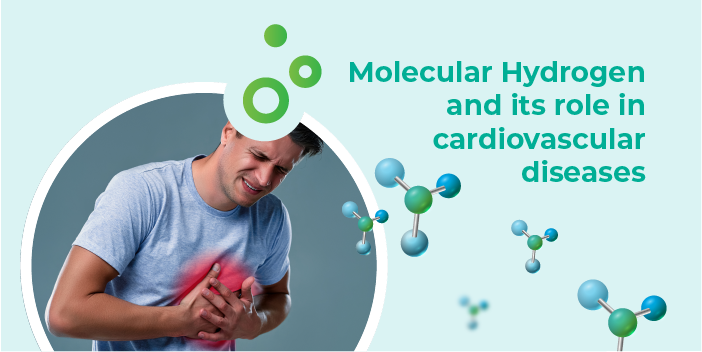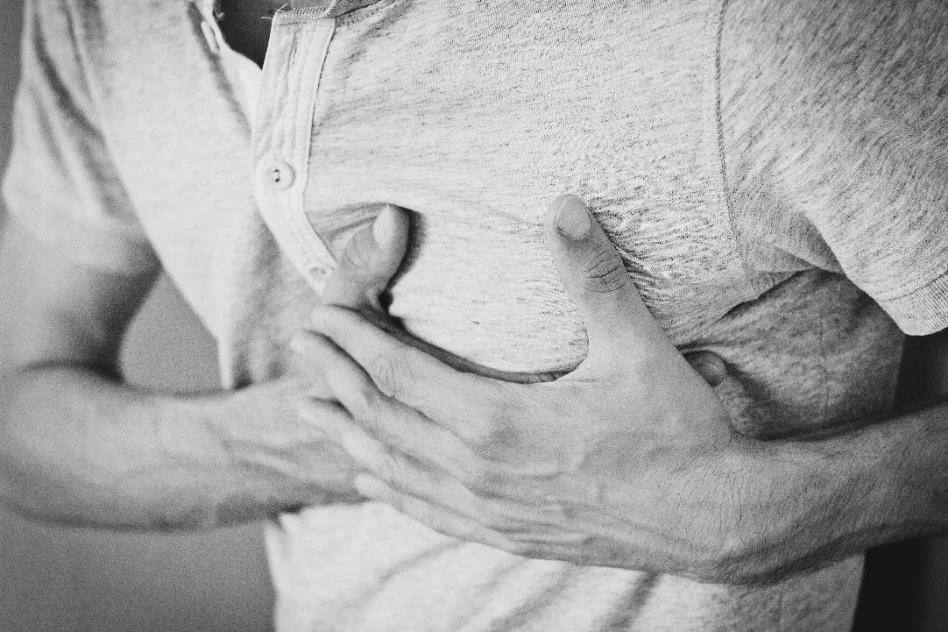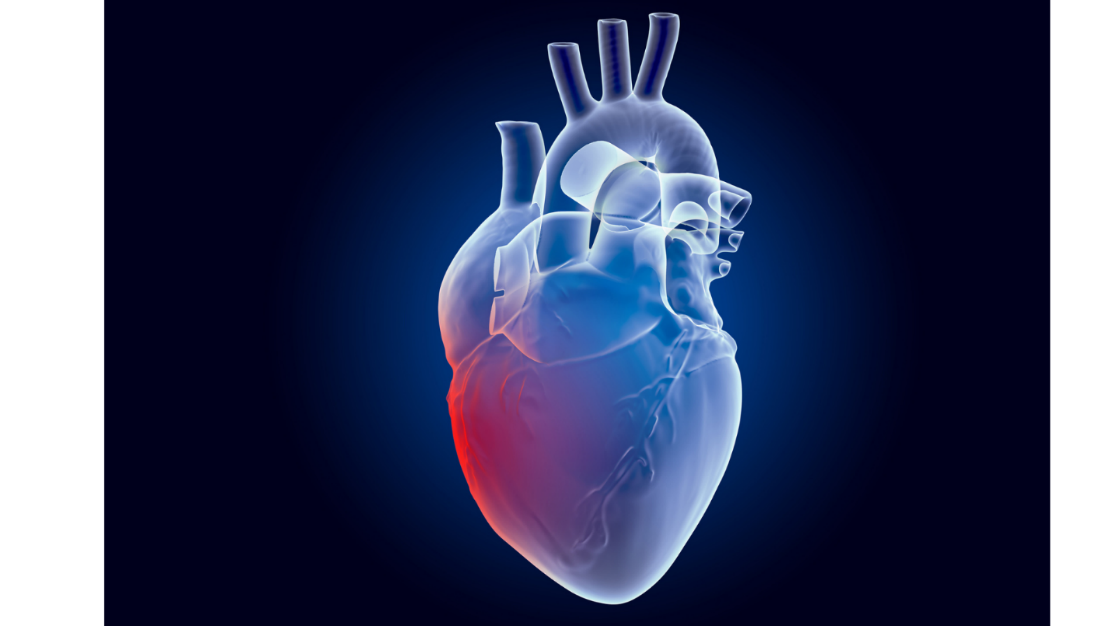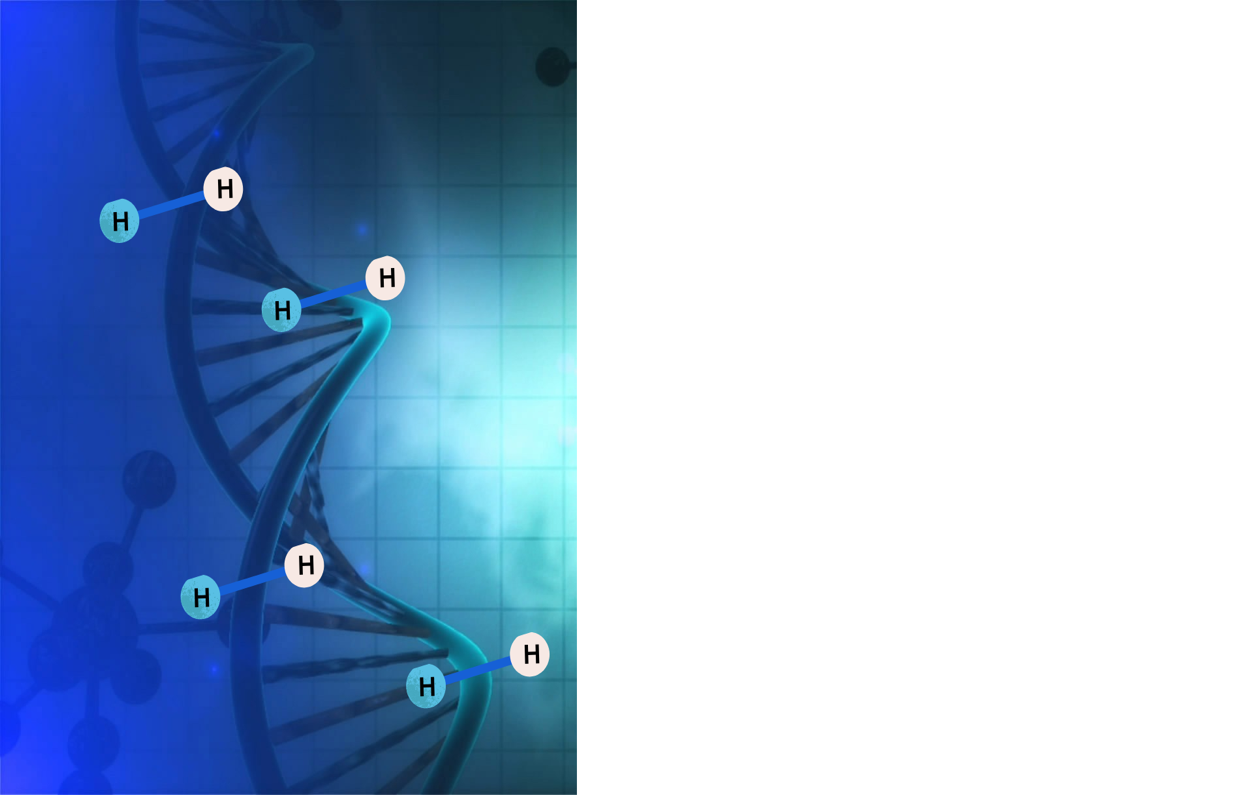Molecular Hydrogen and its role in Cardiovascular Diseases
November 9, 2022 2022-11-28 7:27Molecular Hydrogen and its role in Cardiovascular Diseases

Molecular Hydrogen and its role in Cardiovascular Diseases
Table of Contents
Molecular Hydrogen and its role in Cardiovascular Diseases
Cardiovascular diseases (CVDs) are one of the major health concerns worldwide. They contribute to most of the deaths, and the numbers are still upsurging (1). According to the world health organization report 2016, cardiovascular diseases are the leading reason of morbidity and mortality globally and were responsible for 17.9 million deaths, representing 31% of all worldwide casualties (2). Cardiovascular diseases are a group of medical conditions of the heart & blood vessels, such as coronary heart disease (CHD), heart failure, rheumatic heart disease, hypertensive heart disease, and stroke. Among heart diseases, stroke and ischemic heart disease are the leading cause of death and disability (3). Furthermore, coronary artery disease is another common heart ailment. It also contributes to deaths and disabilities at a massive level as well as accelerates the economic burden. It is estimated that around 23.3 million people may die of this disease by 2030 (4).
Considering these facts, the management of cardiovascular diseases is an exigent need of the global world. Several invasive and noninvasive treatment methods are available to relieve the disease symptoms; however, they are expensive and offer a wide range of side effects on patient health. Therefore, a low-cost, effective and safe treatment strategy is required to improve cardiac health and alleviate diseases. So here hydrogen inhalation therapy comes to light. This therapy has been extensively explored for its beneficial therapeutic effect against many human diseases, such as cancer and neurodegenerative diseases. However, several studies have shown its efficient use in the management of cardiovascular diseases that we will learn about in this article.

Molecular hydrogen and its role in cardiovascular diseases
Molecular hydrogen is an odorless, tasteless, colorless, and non-toxic gas having poor solubility in water. It is an inert molecule that does not react under optimum physiological conditions in mammals. Moreover, it is reported to exert a beneficial biological impact on almost all organs involving the lung, liver, brain, pancreas, and heart (5).
Molecular hydrogen represents an imperative molecule for alleviating reactive oxygen/ nitrogen species (ROS/RNS) regulated diseases and irradiation-induced diseases (6, 7). Besides this, hydrogen gas not only plays an effective part in the regulation of oxidative stress but also offers modulation of signaling pathways, and anti-apoptotic (cytoprotective) and anti-inflammatory effects (5, 8).
Cardiovascular diseases are contributed by many lifestyle and environmental factors. They are also triggered by oxidative stresses (9, 10), inflammation (11), and apoptosis (12) that can be effectively targeted via the therapeutic capacities of molecular hydrogen inhalation therapy.
To comprehend the cardioprotective effect of hydrogen gas, we need to learn the possible mechanisms behind its therapeutic potency against heart diseases.
Mechanisms of molecular hydrogen action to relieve cardiovascular diseases
Molecular hydrogen uses its anti-oxidative, anti-inflammatory, and anti-apoptotic mechanisms to relieve cardiac diseases and improve the overall health of the patients. These action mechanisms of hydrogen may work in synchronization to offer cardioprotective effects and improve cardiac morphology and function.

1. Reduction of reactive oxygen and nitrogen species (ROS/RNS)
Oxidative stress is represented as an imbalance between reactive oxygen/nitrogen species and an antioxidant self-defense system in the body. This dyshomeostasis is considered as a potential cause of several pathological processes as it disturbs or damages imperative cellular and organ functions (13). Reactive oxygen species are generated from the reduction of oxygen that occurs during a typical cell metabolism activity. Reactive oxygen/nitrogen species may include free radicals i.e., OH, RO2, RO, nitric oxide, and other non-radical species which act as oxidizing molecules, for instance, peroxynitrite (ONOO-), ozone (O3), hydrogen peroxide (H2O2) (14). ROS are reported to regulate several gene signaling pathways that trigger cardiovascular pathophysiology. Moreover, peroxynitrite also plays a crucial part in the pathogenic mechanisms of certain heart conditions, including myocardial infarction, stroke, and chronic heart failure. Additionally, an acute or chronic unnecessary intracellular rise of reactive oxygen species is associated with the initiation and development of heart diseases as excessive ROS damage vascular and endothelial smooth muscle cell functions (15). Considering this, the antioxidant potential of molecular hydrogen grabbed massive attention and was investigated in view of cardiovascular diseases.
A study was carried out on chronic heart failure rat models to study the effect of hydrogen inhalation therapy. After one month of hydrogen therapy, the cardiac function was ameliorated in the treated group compared to the control. Further analysis showed that the molecular hydrogen significantly attenuated the apoptosis and oxidative damage in cardiomyocytes. This suggests hydrogen gas as an effective antioxidant with the potential to treat chronic heart failure disease (16).
Similar to this another study explored that inhalation of low concentrations of molecular hydrogen suppresses oxidative stress, recurrent hypoxia-mediated dyslipidemia (imbalance of lipids due to low oxygen concentration in the tissues) and also precludes abnormal thickening and enlargement of heart muscles (cardiomyocytes hypertrophy) and perivascular fibrosis in the myocardium of left ventricle in a mice model. Thus, it is demonstrated that hydrogen inhalation plays a potent role in improving cardiac dysfunction (17).
Another recent study assessed the preemptive effect of hydrogen gas inhalation on vascular remodeling using a vascular injury mouse model. The study revealed that constitutive hydrogen gas inhalation partly diminishes vascular remodeling by removing reactive oxygen species and reducing oxidative stress. Therefore, hydrogen gas inhalation at safe concentrations is proposed as a safe and efficient approach to managing vascular diseases such as atherosclerosis, one of the major causes of myocardial infarction, stroke, and angina (18).
Further, a study focused on hydrogen inhalation therapy for the improvement of ischemic heart disease and alleviation of ischemia/reperfusion injury. The investigations were carried out in a mouse model. Results showed that the therapy significantly decreased reactive oxygen species, and inflammatory signals mediated apoptosis and facilitated the alleviation of myocardial ischemia/reperfusion injury. Moreover, it also ameliorated the no-reflow phenomenon triggered by ischemia/reperfusion. Herein, the reflow phenomenon is the obstruction of blood flow to the ischemic area. It mainly occurs due to reperfusion therapy (19).
2. Anti-apoptotic effects
Apoptosis is a tightly regulated cell death process that is crucial to many cardiovascular diseases, including reperfusion injury, myocardial infarction, and heart failure. Apoptosis is reported to be involved in the acute and chronic loss of cardiomyocytes, particularly in reperfusion injury, ischemic heart disease, the progression of both acute and chronic heart failure, and various types of cardiomyopathies (12).
Several studies have indicated the role of hydrogen inhalation in the inhibition of apoptosis in cardiovascular diseases. A study aimed to examine the anti-apoptotic effects of hydrogen gas inhalation on acute myocardial infarction in the rat model. They administered rats with 2% hydrogen gas for 24 hours. After treatment, amelioration of cardiac dysfunction was observed. Moreover, the hydrogen gas significantly promoted heart function via the regulation of apoptosis and oxidative stress (20).
It is reported that unnecessary fibrosis and alterations in cardiac structure triggered by myocardial infarction severely influence the clinical interventions offered for heart failure. Therefore, a study was carried out on a myocardial infarction rat model to study the effect of antioxidative and anti-inflammatory hydrogen gas on cardiac remodeling and fibrosis. For this experiment, the rats were subjected to hydrogen inhalation at 2% concentration for 28 days (3hr/day). After treatment, significant improvement in cardiac function and reduction of the cardiac fibrotic area was observed. Further, the analysis showed that hydrogen exerted this cardioprotective effect by inhibiting proinflammatory molecules mediated apoptosis in cardiomyocytes (21).
3. Anti-inflammatory effect
Considerable evidence has suggested that inflammation triggers the early stages of the atherosclerotic process. Moreover, an upsurge in the level of inflammatory cytokines is strongly linked with a high risk of developing cardiovascular diseases. However, reduction in inflammation is found beneficial in managing cardiovascular diseases (11, 22). A recent in vivo study has explored the anti-inflammatory properties of hydrogen gas in myocardial infarction rat models. The results revealed significant improvement in cardiac function regulated by inhibition of inflammasome molecule (NLRP3). This receptor or sensor molecule is responsible for inducing inflammation (21). Similarly, hydrogen gas inhalation therapy was examined to relieve myocardial ischemia/reperfusion injury via inhibiting the same inflammasome molecule (NLRP3) and mediated cellular responses (19).
Besides inflammasome, hydrogen gas inhalation therapy is reported to reduce inflammation by regulating the expression levels of inflammatory cytokines such as interleukin-1β, interleukin-6 and tumor necrosis factor- α, and hypoxia-inducible factor 1 alpha (HIF-1α) (23). This limited research evidence provides primary insights about inflammation its role in cardiovascular diseases and its modulation via hydrogen gas therapy. However, further detailed research is required to explore the anti-inflammatory effects of hydrogen gas in almost all cardiac conditions.
4. Regulation of gene expression
Molecular hydrogen is found to regulate gene expression and a number of cell signaling pathways by modulating the activities and expression of certain biomolecules and non-coding RNAs i.e., microRNAs, which may exert therapeutic effects to relieve medical conditions (6, 15, 24). A better understanding of this hydrogen gas mechanism can facilitate the effective and proactive use of this therapy against heart diseases. However, currently, a few studies have focused on this imperative action mechanism of hydrogen gas in relieving cardiovascular diseases. Such as, a study examined the cardioprotective effect of molecular hydrogen gas in diabetic cardiomyopathy (DCM). They revealed that hydrogen gas regulates the AMPK/mTOR/NLRP3 signaling pathway to reduce pro-inflammatory signals mediated cell death. Moreover, the treatment also exhibited amelioration of cardiac dysfunction and improvement in anomalous morphological structure caused by diabetic myocardiopathy (25).
Likewise, another study reported the use of molecular hydrogen gas therapy against lipopolysaccharide-induced heart dysfunction in an animal model. The study showed that hydrogen improved heart function and exerted a cardioprotective effect during septic cardiomyopathy via suppressing the levels of pro-inflammatory cytokines i.e., TNFα, IL-18, and IL-1β. Further, the hydrogen gas was found to modulate the p38, ERK1/2, and JNK genes expression and suppress the expression of TLR4 and nuclear translocation of NF-κB mediated by lipopolysaccharides. Herein, the study suggests the promising role of hydrogen gas therapy in heart conditions (26). Further studies can be initiated to deeply understand the signaling-based therapeutic effect of hydrogen gas to help devise the treatment strategy more effectively.

Clinical studies
Most of the studies related to the role of hydrogen inhalation therapy in cardiovascular diseases are carried out in animal models. Remarkably, the therapy showed quite promising results in relieving disease conditions without exerting any side effects. Additionally, the palpable research studies offer valuable insights to design this therapy for human clinical trials and develop a low-cost and effective treatment method for cardiovascular diseases.
However, one pilot study on hydrogen gas inhalation is available that was conducted by researchers in 2017. The study included twenty patients with ST-elevated myocardial infarction (STEMI) (a severe type of heart attack) and assigned them to either a hydrogen inhalation group (1.3% hydrogen gas with 26% oxygen) or a placebo group (26% oxygen). Following this, they measured the cardiac salvage index on day 7 and onwards after primary percutaneous coronary intervention (PCI). The results showed a significant increase in cardiac salvage or recovery from day 7 onwards in the hydrogen inhalation group as compared to the control group. Moreover, the study exhibited that hydrogen gas inhalation is a feasible and safe treatment during PCI and it may also encourage left ventricle reverse remodeling 6 months after ST elevated myocardial infarction (27). Besides these effective and encouraging results in pilot-scale studies, more similar studies and large-scale clinical trials are required to administer hydrogen inhalation therapy for cardiovascular diseases.
Is hydrogen inhalation therapy safe for humans?
As hydrogen is an inert gas, it does not react with other molecules in normal mammalian physiological conditions. However, many research studies have also used a wide range of hydrogen gas concentrations and found them safe. As the use of hydrogen gas inhalation therapy is a concern for humans, a study was carried out to determine the safe dose of hydrogen gas in healthy individuals to determine its clinical efficacy. They administered 2.4% hydrogen gas in individuals and observed no significant clinical adverse effects, suggesting it is a safe treatment for a number of diseases, including cardiac arrest (28). Moreover, it may help researchers and clinical experts to devise safe hydrogen gas concentrations for curing diseases. Besides being an effective treatment strategy, the low cost of hydrogen gas can help reduce the economic burden of disease.
References
1. Li H, Sureda A, Devkota HP, Pittalà V, Barreca D, Silva AS, et al. Curcumin, the golden spice in treating cardiovascular diseases. Biotechnology Advances. 2020;38:107343.
2. Cao S-Y, Zhao C-N, Gan R-Y, Xu X-Y, Wei X-L, Corke H, et al. Effects and Mechanisms of Tea and Its Bioactive Compounds for the Prevention and Treatment of Cardiovascular Diseases: An Updated Review. Antioxidants. 2019;8(6):166.
3. Roth GA, Mensah GA, Johnson CO, Addolorato G, Ammirati E, Baddour LM, et al. Global burden of cardiovascular diseases and risk factors, 1990–2019: update from the GBD 2019 study. Journal of the American College of Cardiology. 2020;76(25):2982-3021.
4. Han Y, Xie H, Liu Y, Gao P, Yang X, Shen Z. Effect of metformin on all-cause and cardiovascular mortality in patients with coronary artery diseases: a systematic review and an updated meta-analysis. Cardiovascular Diabetology. 2019;18(1):96.
5. Fu Z, Zhang J. Molecular hydrogen is a promising therapeutic agent for pulmonary disease. Journal of Zhejiang University-SCIENCE B. 2022;23(2):102-22.
6. Ohta S. Molecular hydrogen as a preventive and therapeutic medical gas: initiation, development and potential of hydrogen medicine. Pharmacology & Therapeutics. 2014;144(1):1-11.
7. Kura B, Bagchi AK, Singal PK, Barancik M, LeBaron TW, Valachova K, et al. Molecular hydrogen: Potential in mitigating oxidative-stress-induced radiation injury. Canadian Journal of Physiology and Pharmacology. 2019;97(4):287-92.
8. Slezák J, Kura B, Frimmel K, Zálešák M, Ravingerová T, Viczenczová C, et al. Preventive and therapeutic application of molecular hydrogen in situations with excessive production of free radicals. Physiological Research. 2016;65.
9. Tsutsui H, Kinugawa S, Matsushima S. Oxidative stress and heart failure. American journal of physiology-Heart and circulatory physiology. 2011;301(6):H2181-H90.
10. Baradaran A, Nasri H, Rafieian-Kopaei M. Oxidative stress and hypertension: Possibility of hypertension therapy with antioxidants. Journal of research in medical sciences: the official journal of Isfahan University of Medical Sciences. 2014;19(4):358.
11. Sorriento D, Iaccarino G. Inflammation and cardiovascular diseases: the most recent findings. MDPI; 2019. p. 3879.
12. Kim N-H, Kang PM. Apoptosis in cardiovascular diseases: mechanism and clinical implications. Korean circulation journal. 2010;40(7):299-305.
13. Ďuračková Z. Some current insights into oxidative stress. Physiological research. 2010;59(4).
14. Moris D, Spartalis M, Spartalis E, Karachaliou G-S, Karaolanis GI, Tsourouflis G, et al. The role of reactive oxygen species in the pathophysiology of cardiovascular diseases and the clinical significance of myocardial redox. Annals of translational medicine. 2017;5(16).
15. LeBaron TW, Kura B, Kalocayova B, Tribulova N, Slezak J. A new approach for the prevention and treatment of cardiovascular disorders. Molecular hydrogen significantly reduces the effects of oxidative stress. Molecules. 2019;24(11):2076.
16. Chi J, Li Z, Hong X, Zhao T, Bie Y, Zhang W, et al. Inhalation of hydrogen attenuates progression of chronic heart failure via suppression of oxidative stress and P53 related to apoptosis pathway in rats. Frontiers in Physiology. 2018;9:1026.
17. Hayashi T, Yoshioka T, Hasegawa K, Miyamura M, Mori T, Ukimura A, et al. Inhalation of hydrogen gas attenuates left ventricular remodeling induced by intermittent hypoxia in mice. American Journal of Physiology-Heart and Circulatory Physiology. 2011;301(3):H1062-H9.
18. Kiyoi T, Liu S, Takemasa E, Nakaoka H, Hato N, Mogi M. Constitutive hydrogen inhalation prevents vascular remodeling via reduction of oxidative stress. PloS one. 2020;15(4):e0227582.
19. Nie C, Ding X, Rong A, Zheng M, Li Z, Pan S, et al. Hydrogen gas inhalation alleviates myocardial ischemia-reperfusion injury by the inhibition of oxidative stress and NLRP3-mediated pyroptosis in rats. Life Sciences. 2021;272:119248.
20. Yang H, Liu S, Du H, Hong Z, Lv Y, Nie C, et al. Hydrogen Attenuates Myocardial Injury in Rats by Regulating Oxidative Stress and NLRP3 Inflammasome Mediated Pyroptosis. International Journal of Medical Sciences. 2021;18(14):3318.
21. Nie C, Zou R, Pan S, Gao Y, Yang H, Bai J, et al. Hydrogen gas inhalation ameliorates cardiac remodelling and fibrosis by regulating NLRP3 inflammasome in myocardial infarction rats. Journal of Cellular and Molecular Medicine. 2021;25(18):8997-9010.
22. Ridker PM, Everett BM, Thuren T, MacFadyen JG, Chang WH, Ballantyne C, et al. Antiinflammatory therapy with canakinumab for atherosclerotic disease. New England journal of medicine. 2017;377(12):1119-31.
23. Liang I-C, Ko W-C, Hsu Y-J, Lin Y-R, Chang Y-H, Zong X-H, et al. The anti-inflammatory effect of hydrogen gas inhalation and its influence on laser-induced choroidal neovascularization in a mouse model of neovascular age-related macular degeneration. International Journal of Molecular Sciences. 2021;22(21):12049.
24. Ichihara M, Sobue S, Ito M, Ito M, Hirayama M, Ohno K. Beneficial biological effects and the underlying mechanisms of molecular hydrogen-comprehensive review of 321 original articles. Medical gas research. 2015;5(1):1-21.
25. Zou R, Nie C, Pan S, Wang B, Hong X, Xi S, et al. Co-administration of hydrogen and metformin exerts cardioprotective effects by inhibiting pyroptosis and fibrosis in diabetic cardiomyopathy. Free Radical Biology and Medicine. 2022;183:35-50.
26. Tan S, Long Z, Hou X, Lin Y, Xu J, You X, et al. H2 protects against lipopolysaccharide-induced cardiac dysfunction via blocking TLR4-mediated cytokines expression. Frontiers in Pharmacology. 2019;10:865.
27. Katsumata Y, Sano F, Abe T, Tamura T, Fujisawa T, Shiraishi Y, et al. The effects of hydrogen gas inhalation on adverse left ventricular remodeling after percutaneous coronary intervention for ST-elevated myocardial infarction―first pilot study in humans―. Circulation Journal. 2017:CJ-17-0105.
28. Cole AR, Sperotto F, DiNardo JA, Carlisle S, Rivkin MJ, Sleeper LA, et al. Safety of prolonged inhalation of hydrogen gas in air in healthy adults. Critical care explorations. 2021;3(10).



